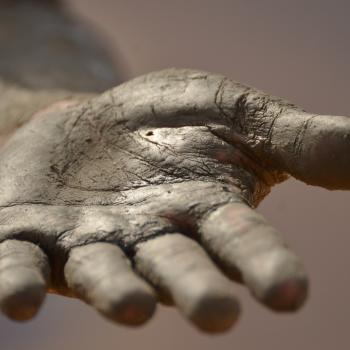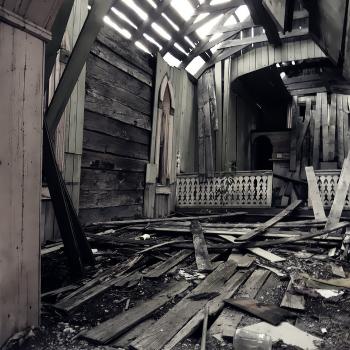
For many who have come from a middle-class American Evangelical background with solid, godly roots, there is a certain rightness to life that cannot be denied. This rightness includes a mélange of middle-class American values and Evangelical values, and it’s pretty hard to slice them down the middle. They coinhere. Many of us are kind of stuck in puritan mode—the small-p, pinched-face sort, not the good kind.
These values are fairly tidy and can lead to a fairly tidy life—if, of course, you a) have the social, financial, and familial capital to uphold them, and b) you practice them religiously. (No pun there.) To be an Evangelical includes (in no particular order): responsibility, hard work, godliness, chastity, sobriety, an appreciation for education, self-sacrifice, regular church attendance, some personal devotional life, and a measure of frugality (within comfortable limits, of course). (The Bebbington Quadilateral is a better theological summary, but you know these are the virtues we applaud.)
These aren’t ingredients in a recipe per se or a formula for success—bad things happen to good people, obviously—but they often serve as “markers” for a prescribed life. Those who embrace this tidiness may look at the world with an eyebrow cocked and a certain furrow between brows and wonder “what on earth.” People, people, people! Bad choices, bad habits, bad relationships. Tsk, tsk, tsk.
And when we are not shaking heads with dismay, we’re trying to squeeze people into the same tidy mold. Children, neighbors, co-workers; politics, churches, schools; the poor, the rich, the foreigner. We have a prescription for what ails them, but they won’t take our medicine.
We stand on our porches and survey the world like Aunt Bee—generally well-meaning but a little shocked.
As they so often do, the saints correct us, their quiet voices like a background conversation behind the noise of modern spirituality. Hagar, twice cast out into a pitiless future and twice met by God. Francis Thompson, hounded and haunted as he hustled away from God until he could run no further. And Augustine—yes, some bad choices, some bad theology, and considerable resistance to the claims of God on his life until God wore him down. These stories, and so many like them, turn on that moment of surprise when the sinner/saint realizes that he or she is not—and has not ever been—alone. God’s hand was present in all the events of their lives. God gave them the freedom to take paths of their own choosing and yet managed to place himself at the end of every path.
Sometimes it just seems to me that American Evangelicals are not very free. They are bound up in their own sense of rightness, twisted in knots with anxiety about the wellbeing of others, and harried by an excessive fear of the consequences of bad choices.
Of course this is no excuse for a devil-may-care attitude; there are endless reasons for lament, endless calls to intercessory prayer, endless opportunities for unceasing care. But freedom doesn’t mean recklessness, it means confidence in the God whose eye sees all and whose plan is to gather all.
We can be patient—with ourselves and with others, and even with God.
















